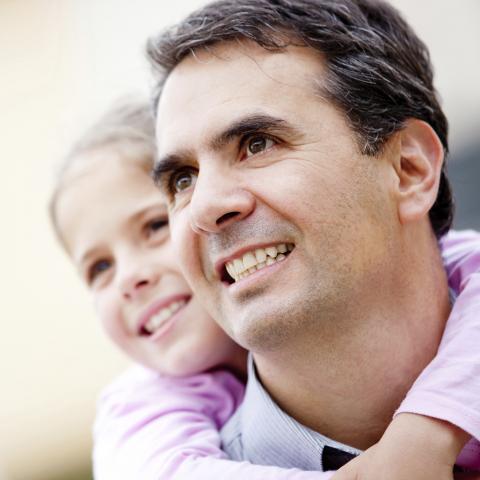Father’s Day, celebrated in most countries around the world, is a special day set aside to honor one’s father (or father-figure). There’s something about the love and care of a father that’s unmatched by anything else, so it’s important to show appreciation and gratitude to them on this day.
In Germany, this is called Vatertag, and you’ll soon find that celebrations in Germany are pretty unique compared to celebrations elsewhere. At GermanPod101.com, we hope to make learning about Vatertag in Germany fun, and provide you with great insight into German culture. For in knowing a country’s culture, you can master the language in context of the bigger picture.
Let’s get started, and delve into Vatertag Deutschland (“Father’s Day Germany”)!
1. What is Father’s Day in Germany?
Father’s Day (Vatertag in Germany) was introduced as a special day for honoring fathers. It doesn’t always have the same calendar date because of Easter, which is movable.
The tradition of Father’s Day comes from the United States. There, the Father’s Day was founded by Sonora Smart Dodd. Her father had fought in the American Civil War, so in 1910 she called for a movement to honor fathers. Then, via the USA, this day to honor fathers also came to Germany.
2. When is Father’s Day in Germany?
The date of Father’s Day varies each year, though it’s always celebrated on Ascension Day, interestingly enough. For your convenience, here’s a list of this holiday’s date for the next ten years.
- 2019: May 30
- 2020: May 21
- 2021: May 13
- 2022: May 26
- 2023: May 18
- 2024: May 9
- 2025: May 29
- 2026: May 14
- 2027: May 6
- 2028: May 25
3. Reading Practice: Unique Father’s Day Celebrations
How do Germans celebrate Father’s Day? You might be surprised. 😉 Read the German text below to find out, and find the English translation directly below it.
—
Am Vatertag findet in manchen Regionen in Deutschland die sogenannte Herrenpartie statt, an der, wie der Name schon vermuten lässt, traditionell nur Männer verschiedenen Alters gemeinsam etwas unternehmen. Dies können zum Beispiel Wanderungen oder auch Ausflüge mit der Pferdekutsche oder auf dem Wasser sein. Während oder als Abschluss des Tages kehren die Teilnehmenden oft in Gaststätten ein.
Der Vatertag wird in einigen Familien auch für Familienausflüge genutzt oder um gemeinsam über das verlängerte Wochenende in den Urlaub zu fahren. Der Freitag nach Vatertag ist ein sogenannter Brückentag, das heißt, das Kinder auch an diesem Tag schulfrei haben. Viele Väter oder Eltern gehen mit ihren Kindern beispielsweise in den Zoo oder machen ein Picknick im Freien.
Manche Männer gestalten ihre sogenannte Herrenpartie mit einem Fahrraderlebnis besonderer Art: Ein geräumiges Fahrrad bietet bis zu 16 Personen Platz und ermöglicht durch die Integration eines Fasses in der Mitte des Fahrrades das Biertrinken während der Fahrt.
—
On Father’s Day, the so-called “gentlemen’s party” takes place in some German regions. As the name suggests, only men of a different age are allowed to take part in this traditional event. It could be a walk, or an outing on horse-drawn carriages or on the beach. During or at the end of the day, the participants often stop at restaurants.
On Father’s Day, some families go out for family trips or go on vacation together on an extended weekend. The Friday after Father’s Day is a so-called bridge day, means it is a school holiday for children as well. Many fathers or parents go out with their children to the zoo or for a picnic, for example.
Some men arrange to have a special bicycle experience for their “gentlemen’s party”: a spacious bike that offers up to sixteen seats and makes it possible for the riders, through the incorporation of a barrel in the middle of the bike, to drink beer while riding.
4. A Shared Holiday
On which public holiday is Father’s Day celebrated every year in Germany?
The holiday is called the Ascension Day. The Solemnity of the Catholic Church is always forty days after Easter, so between April 30 and June 3. Since the 1930s, Ascension Day has been observed as a public holiday in Germany.
5. Useful Vocabulary for Father’s Day in Germany
Here’s some vocabulary you should know for Father’s Day in Germany!
- Sonntag — Sunday
- Sohn — Son
- Geschenk — Present
- Tochter — Daughter
- Lieben — Love
- Vater — Father
- Abendessen — Dinner
- Grußkarte — Greeting card
- Feiern — Celebrate
- Geschenkgutschein — Gift certificate
- Vatertag — Father’s Day
To hear each vocabulary word pronounced, check out our German Father’s Day vocabulary list. Here, you’ll find each word for accompanied by an audio file of its pronunciation.
Conclusion
What do Father’s Day celebrations look like in your country? Are they similar or very different from Vatertag (Germany’s Father’s Day)? Let us know in the comments; we always love to hear from you!
If you want to learn more about German culture and holidays, and of course the German language, visit us at GermanPod101.com! We offer learning tools for every student, ensuring that every student can master German—at their own pace, and in a way that’s both fun and informative. Check out our free vocabulary lists, insightful blog posts, and online community forum to get started! By upgrading to a Premium Plus account, you can also take advantage of our MyTeacher program, and learn German one-on-one with your own personal teacher.
Feeling determined? Your hard work will soon be well worth it, and soon you’ll be speaking German like a native!
Until next time, Glücklicher Vatertag (“Happy Father’s Day” in German)!













